|
|
|
Sort Order |
|
|
|
Items / Page
|
|
|
|
|
|
|
| Srl | Item |
| 1 |
ID:
133227
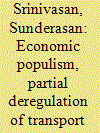

|
|
|
|
|
| Publication |
2014.
|
| Summary/Abstract |
The Indian political class is known to employ populist, albeit economically unsustainable, measures to replace intrinsic 'valence', especially shortly prior to election windows. Such measures include loan-waivers, interest rate concessions, provision of free electricity for agriculturists, etc. The union government's leverage to maneuver and to micro-manage retail fuel prices within partially deregulated environments is hypothesized to provide incumbents with an advantage over rival contestants in the electoral process. This paper analyzes the evolution in the retail prices of diesel and petrol (gasoline), and the transfer of such evolution, into the inflation index of the 'all commodity' basket. It is observed that when international benchmark prices are relatively low and domestic inflation is moderate, the transfer occurs within about 42 weeks. During periods of high oil prices-frequently above USD 100 a barrel-and high inflation-higher than 5.00-5.50%-prices of petroleum distillates tend to feed into overall inflation more rapidly, within about 34-40 weeks.
The study, covering a total of 82 elections for the central and state (provincial) governments during the period 2000 to 2013, concludes that even as patterns of manipulation of prices are apparent, ceteris paribus, such leverage does not necessarily seem to translate into favorable electoral outcomes. This conclusion reiterates observations that economic im/prudence may not necessarily determine electoral outcomes, and that the basis for electoral choices made by the Indian voter-consumer remains subjective.
|
|
|
|
|
|
|
|
|
|
|
|
|
|
|
|
| 2 |
ID:
127832
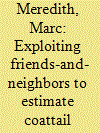

|
|
|
|
|
| Publication |
2013.
|
| Summary/Abstract |
Federalist democracies often hold concurrent elections for multiple offices. A potential consequence of simultaneously voting for multiple offices that vary with respect to scope and scale is that the personal appeal of candidates in a high-profile race may affect electoral outcomes in less salient races. In this article I estimate the magnitude of such coattail effects from governors onto other concurrently elected statewide executive officers using a unique dataset of county election returns for all statewide executive office elections in the United States from 1987 to 2010. I exploit the disproportionate support that candidates receive from geographically proximate voters, which is often referred to as the friends-and-neighbors vote, to isolate variation in the personal appeal of candidates. I find that a one-percentage-point increase in the personal vote received by a gubernatorial candidate increases the vote share of their party's secretary of state and attorney general candidates by 0.1 to 0.2 percentage points. In contrast, personal votes for a secretary of state or attorney general candidate have no effect on the performance of their party's gubernatorial candidate or other down-ballot candidates
|
|
|
|
|
|
|
|
|
|
|
|
|
|
|
|
| 3 |
ID:
102083
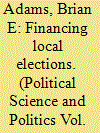

|
|
|
| 4 |
ID:
104042
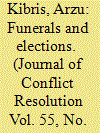

|
|
|
|
|
| Publication |
2011.
|
| Summary/Abstract |
This article empirically analyzes the effects of terrorism on the electoral choices of the Turkish voters in the 1991 and 1995 general elections. It relies on a unique data set that includes the date and the place of burial of Turkish soldiers and police officers who died in the fight against the terrorist organization PKK. The author uses the number of these security force terror casualties at the district level as a measure of the level of terrorism that the people of that district have been exposed to and analyzes whether and how exposure to terrorism affects people's electoral choices. The results indicate that Turkish voters are highly sensitive to terrorism and that they blame the government for their losses. Moreover, exposure to terrorism leads to an increase in the vote share of the right-wing parties who are less concessionist toward the terrorist organization's cause compared to their left-wing counterparts.
|
|
|
|
|
|
|
|
|
|
|
|
|
|
|
|
| 5 |
ID:
086766
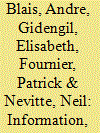

|
|
|
|
|
| Publication |
2009.
|
| Summary/Abstract |
This article assesses the aggregate effect of information shortfall on the outcome of the last six Canadian elections. Building on Bartels' analysis, the authors find an information effect in three of the six elections examined, and in each case the information gap benefits the Liberal Party. That finding raises the question: why does information matter in some contexts but not in others? It is argued in this article that the information gap is related to lack of visibility. When and where all political parties have some degree of visibility, the less informed vote like the better informed, but when and where a party is hardly visible, the less informed are less likely to support that party. The less informed appear to consider a smaller set of options when they decide how to vote.
|
|
|
|
|
|
|
|
|
|
|
|
|
|
|
|
| 6 |
ID:
076115


|
|
|
| 7 |
ID:
188240
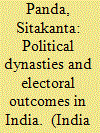

|
|
|
|
|
| Summary/Abstract |
Political dynasties, a salient feature of the electoral politics in many electoral democracies, have critical governance implications. However, careful empirical estimates of the dynasty premium in Indian elections and explanation of their constituency-level demand side (voters) and supply side (political parties) determinants are absent. To fill this gap, we analyze the candidate-level (N = 8251) data on the 2014 Lok Sabha elections and find that a dynastic candidate is a significant 13% more likely to win and has a significant 18%–20% higher vote share than a non-dynastic candidate. This result is robust to consideration of an alternative dynasty variable as outcome, usage of alternative indicators of candidate criminality as controls, and a procedure of deducing bias due to selection on unobservables from selection on observables. In the constituency-level analyses, having a dynastic incumbent legislator in fray and dynasts’ relative wealth increases the probability of a dynastic winner and a more competitive election given the dynastic incumbent reduces it. Voter dissatisfaction, dynasts’ relative wealth, reserved constituency, and given a dynastic incumbent, higher political competition reduce voter preference for dynasts, whereas dynastic entrenchment and dynastic incumbent reduce it. The dynastic incumbent, dynasts’ relative wealth, and voter dissatisfaction significantly increase political parties’ preferences for dynasts.
|
|
|
|
|
|
|
|
|
|
|
|
|
|
|
|
| 8 |
ID:
121626
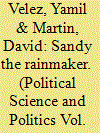

|
|
|
|
|
| Publication |
2013.
|
| Summary/Abstract |
The arrival of Hurricane Sandy within a week of the 2012 presidential election caused unprecedented disruption to the final days of the campaign and Election Day in areas that were affected. The precise impact of the storm on those areas hit hardest was not necessarily clear. Contrary to prior research on the effect of disasters on electoral outcomes, we find that the president's vote share was ultimately increased in storm-affected areas by about four percentage points, plus or minus two points. While those states most heavily affected were unlikely to give their electoral vote to Romney because of other factors, we present counterfactual analyses that show that such a storm could have had a significant impact on swing states: although the storm only affected some areas, we show that Virginia would likely have been won by Romney were it not hit at all, whereas North Carolina would likely have gone for Obama had it been directly in the storm's path.
|
|
|
|
|
|
|
|
|
|
|
|
|
|
|
|
| 9 |
ID:
187667


|
|
|
|
|
| Summary/Abstract |
Scholars frequently expect parties to act strategically in parliament, hoping to affect their electoral fortunes. Voters assumingly assess parties by their activity and vote accordingly. However, the retrospective voting literature looks mostly at the government’s outcomes, leaving the opposition understudied. We argue that, for opposition parties, legislative voting constitutes an effective vote-seeking activity as a signaling tool of their attitude toward the government. We suggest that conflictual voting behavior affects voters through two mechanisms: as a signal of opposition valence and as means of ideological differentiation from the government. We present both aggregate- and individual-level analyses, leveraging a dataset of 169 party observations from 10 democracies and linking it to the CSES survey data of 27,371 respondents. The findings provide support for the existence of both mechanisms. Parliamentary conflict on legislative votes has a general positive effect on opposition parties’ electoral performance, conditional on systemic and party-specific factors.
|
|
|
|
|
|
|
|
|
|
|
|
|
|
|
|
|
|
|
|
|